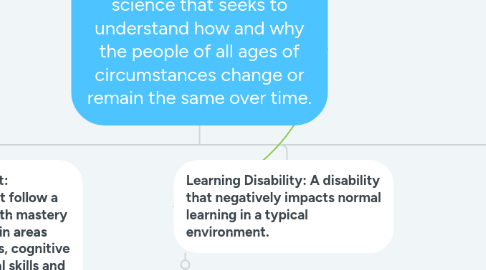
1. Typical Development: Development following a predictable course with mastery of certain milestones in areas such as language skills, cognitive skills, social emotional skills and physical skills.
1.1. Infant development- Birth to age 1. Stage when children go from babies to toddlers.
1.1.1. Toddler development- Ages 1-3 years old. This is when children start taking steps toward becoming an independent person.
1.1.1.1. . Preschool development- 3-5 years old, children become more physical and enjoy participating in cooperative play.
1.1.1.1.1. Middle Childhood Development- 6-11 years old, begin school and display increased independence from family.
2. Physical Development: Refers to the development advancements and refinements of motor skills.
2.1. Cognitive development- How children think, explore, and figure things out.
2.1.1. Social-emotional development- Refers to the process by which a child learns to interact with others around them.
2.1.1.1. Language development- Process by which children come to understand and communicate.
2.1.1.1.1. Character development- The formation of a child’s personality from an early age.
3. Learning Disability: A disability that negatively impacts normal learning in a typical environment.
3.1. Specific learning disability- Covers specific groups of learning challenges. These conditions affect a child’s ability to read, write, speak, reason or do math.
3.1.1. Intellectual Disability- Below average intellectual disability. Poor communication, self care, and social skills.
3.1.1.1. Multiple Disabilities- More than 1 condition covered by IDEA.
3.1.1.1.1. Other Health Impairment- Covers conditions that limit a child’s strength, energy, or alertness.
4. Atypical Development: Development does not follow a predictable course with mastery of certain milestones in areas such as language skills, cognitive skills, social-emotional skills and physical skills.
4.1. Intellectual Disability- Below average intellectual disability. Poor communication, self care, and social skills.
4.1.1. Deaf blindness- A child born with hearing and visual disabilities evident before age 3.
4.1.1.1. Deafness- Kids with a diagnosis of full deafness. These kids cannot hear most all sounds even with a hearing aide.
4.1.1.1.1. Speech or language impairment- Covers speech or language difficulties.

